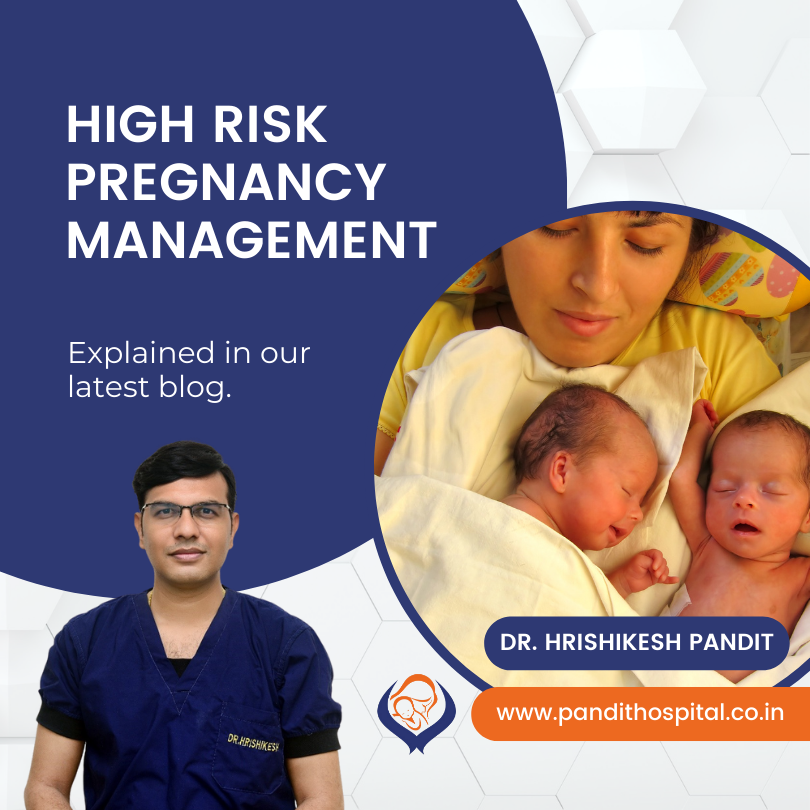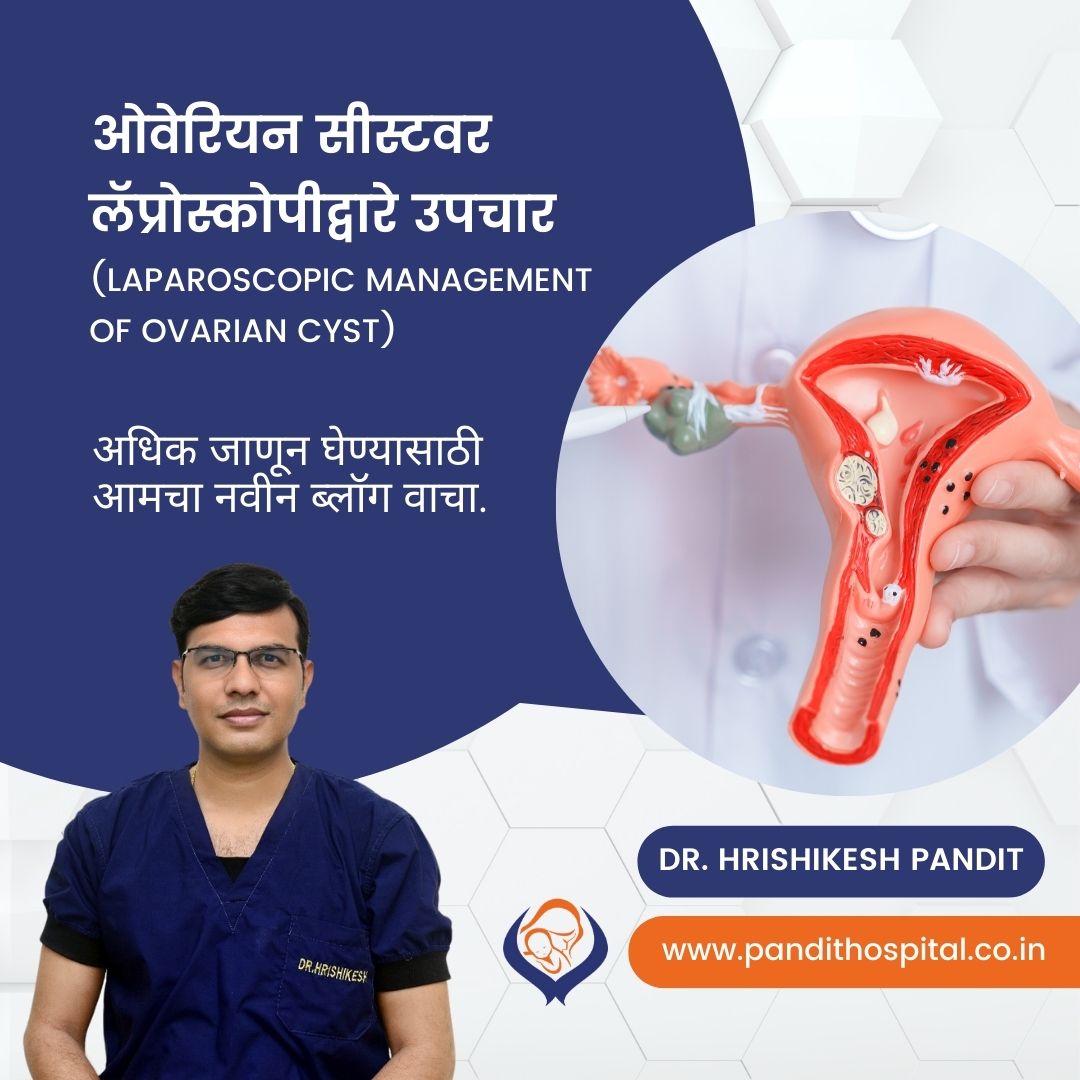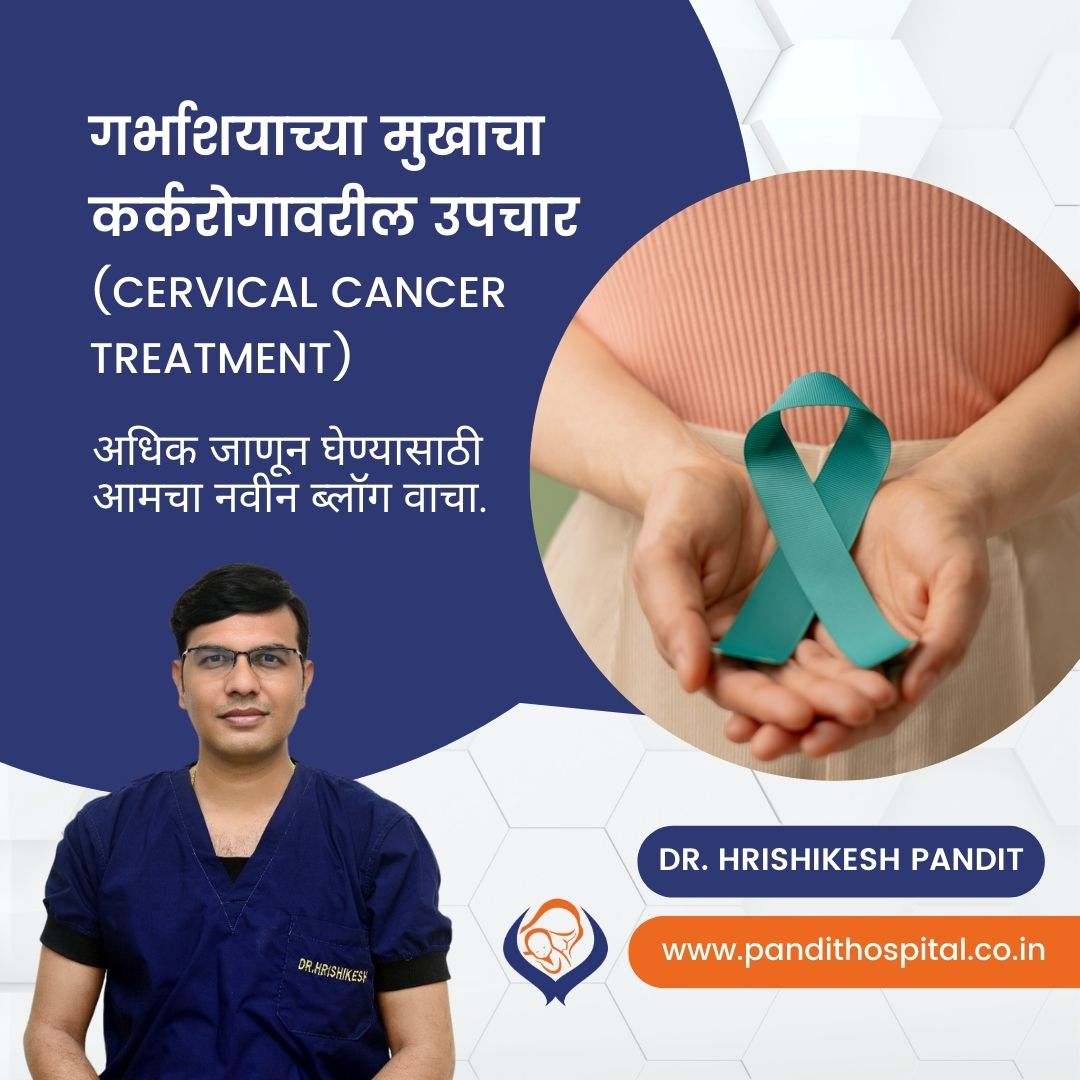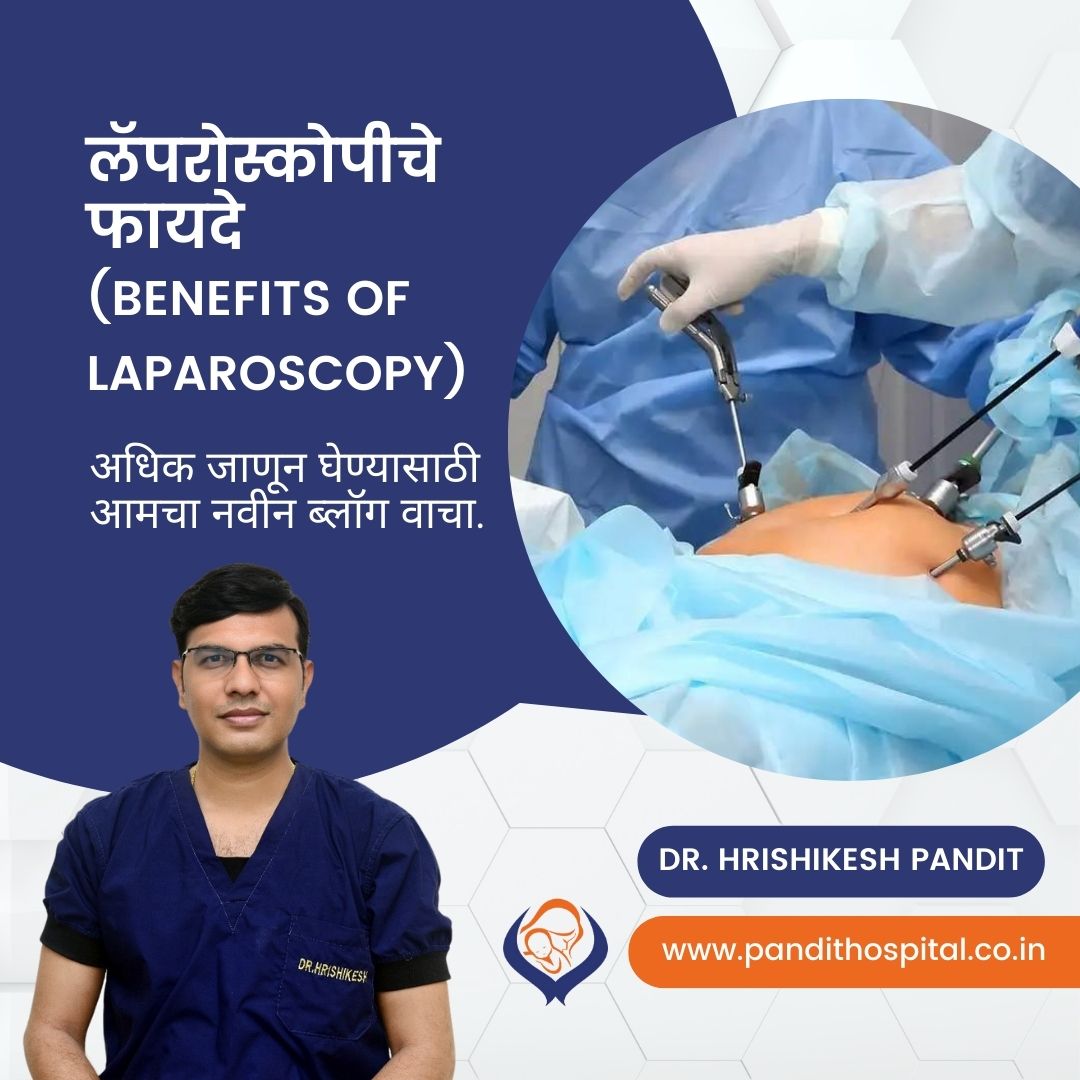A high-risk pregnancy can be a challenging and delicate situation for both the expectant mother and her healthcare team. It requires specialized care, attention, and expertise to ensure the best possible outcome for both the mother and the baby. Pandit Hospital, led by the renowned obstetrician & laparoscopic gynecologist Dr. Hrishikesh Pandit, has established itself as a trusted healthcare institution that provides exceptional care and management for high-risk pregnancy cases. In this blog post, we will explore what constitutes a high-risk pregnancy, the importance of expert care, and how Pandit Hospital stands out in providing comprehensive support to women facing these unique challenges.
High-risk pregnancy refers to a pregnancy type involving higher health risks for a pregnant woman, her fetus, or both. This demands extra care and protection for the would-be mother before, during, and after giving childbirth.
In India, about 20%–30% of pregnancies belong to the high-risk category, which is responsible for 75% of perinatal morbidity and mortality.
- Preexisting health conditions:
- Autoimmune diseases, such as lupus or multiple sclerosis (MS).
- COVID-19.
- Diabetes.
- Fibroids.
- High blood pressure.
- HIV/AIDS.
- Kidney disease.
- Low body weight (BMI of less than 18.5).
- Mental health disorders, such as depression.
- Obesity.
- Polycystic ovary syndrome (PCOS).
- Thyroid disease.
- Blood clotting disorders.
- Pregnancy-related health conditions:
- Birth defects or genetic conditions in the fetus.
- Poor growth in the fetus.
- Gestational diabetes.
- Multiple gestation (pregnancy with more than one fetus, such as twins or triplets).
- Preeclampsia and eclampsia.
- Previous preterm labor or birth, or other complications with previous pregnancies.
- Lifestyle factors (including smoking, drug addiction, alcohol abuse and exposure to certain toxins).
- Age (being over 35 or under 17 when pregnant).
- Preeclampsia (high blood pressure from pregnancy).
- Eclampsia (seizure from pregnancy).
- Preterm delivery.
- Excessive bleeding during labor and delivery, or after birth.
- Low or high birth weight.
- Birth defects.
- Problems with the fetus’s brain development.
- Neonatal intensive care unit admission for your baby.
- Intensive care unit admission may require for mother.
- Miscarriage.
- Stillbirth.
- Regular consultations with obstetrician.
- Consultation with a physician if required for uncontrolled diabetes or preeclampsia.
- Regular periodic blood tests to assess hemoglobin, thyroid profile, urinary infection, or any fetal birth defects.
- Repeated ultrasounds and closer fetal evaluation.
- Home blood pressure monitoring.
- Careful monitoring of medications used to manage preexisting conditions.
- Avoiding drugs and alcohol.
- Identifying potential health risks before getting pregnant. Tell your doctor about your familial and personal medical history.
- Maintaining a healthy body weight before pregnancy.
- Managing any preexisting health conditions, you may have.
- Making sure any long-term medications are safe to take during pregnancy.
- Quitting smoking.
- Planning pregnancies between the ages of 18 and 34.
- Practicing safe sex.
Dr. Hrishikesh Pandit, an accomplished obstetrician and the driving force behind Pandit Hospital, is renowned for his expertise in managing high-risk pregnancies. His comprehensive approach ensures that every patient receives personalized care tailored to their specific needs.
With its exceptional team, cutting-edge facilities, and personalized care, the hospital offers a haven of support and expertise for expectant mothers facing complex pregnancy challenges. The commitment to providing the best care throughout the journey sets Pandit Hospital apart and ensures the well-being of both the mother and the baby.
If you or a loved one is facing a high-risk pregnancy, Pandit Hospital could be the trusted partner you seek on this delicate journey.
What is the cost of normal delivery in Ahmednagar?
At Pandit Hospital, we provide complete maternity care from antenatal period to delivery of the baby. For normal delivery, we modern well equipped labor room. Pediatrician is always available to assess baby’s condition post-delivery. Overall cost of normal delivery at Pandit Hospital, Ahmednagar is around ₹17,000 to ₹20,000.
What is the cost of cesarean section delivery in Ahmednagar?
In case of medical history or emergency, cesarean section has to be performed. We have state-of-the-art operation theater to provide best surgical care to our patients at Pandit Hospital. Cesarean section delivery will cost around ₹30,000.
At Pandit Hospital, Dr. Hrishikesh Pandit and his team will take all the precautions to avoid any complications during delivery.
Dr. Hrishikesh Pandit has been involved directly in more than ten thousand deliveries. His experience in obstetrics makes him the best gynecologist in Ahmednagar.
At Pandit Hospital, you are in safe hands!
To consult Dr. Hrishikesh Pandit, Click Below,
Pandit Hospital – Best Maternity care center in Ahmednagar
LET’S SEE OUR INTRO VIDEO
At Pandit Hospital, we provide all the maternity services from antenatal to postnatal period under one roof
Let's Connect!!
0241-2441717 / 0241-2442344
About author:
Dr. Hrishikesh Pandit:
Dr. Hrishikesh Pandit is one of the best obstetrician and gynecologist in India. He is also a well-renowned Laparoscopic surgeon. He obtained his MS (Ob Gyn) degree from the prestigious Pravara Institute of Medical Sciences. He has also done fellowship and diploma courses in laparoscopic surgeries and cancer treatment from Tata Hospital and Keil University, Germany. His surgical cases, papers and videos has been chosen in many international forums of gynecology.
At Pandit Hospital, we are always working hard to provide its patients with the highest level of medical innovation and patient care. With the aim of delivering complete maternity & gynecological care under one roof with the help of all contemporary amenities and cutting-edge medical equipment. Dr. Hrishikesh Pandit has a vision to bring the best of facilities regarding laparoscopy surgeries in the city of Ahmednagar. He is the pioneer of 3D Laparoscopy technology is Ahmednagar.
Latest Articles
Dr. Hrishikesh Pandit is one of the best laparoscopy surgeons in India. His determination to bring 3D Laparoscopy technology to Ahmednagar has eventually helped so many patients. Read the latest articles by Dr. Hrishikesh Pandit on Gynecology, gastric issues, and health tips for mothers during pregnancy.
Discover comprehensive ovarian cyst treatments at Pandit Hospital in Ahmednagar, Maharashtra, led by 3D Laparoscopic Surgeon Dr. Hrishikesh Pandit. Learn about types, symptoms, and both surgical and non-surgical treatments. Best ovarian cyst removal hospital in India.
गर्भाशयाच्या मुखाचा कर्करोग हा महिलांमध्ये होणारा दुसरा सर्वात गंभीर कॅन्सर आहे. वयाच्या 35 व्या वर्षानंतर या आजाराचा धोका फार वाढतो. गर्भाशयाच्या कर्करोगावर लॅपरोस्कोपी (दुर्बिणीने) शस्त्रक्रियेद्वारे उपचार केले जाऊ शकतात.
लॅपरोस्कोपिक शस्त्रक्रियेचे अनेक फायदे आहेत ✔ कमी वेदना ✔ कमी रक्तस्त्राव ✔ रुग्णालयात किमान मुक्काम ✔ जलद रिकव्हरी ✔ कमी कॉम्प्लिकेशन्स ✔ कमी टाके ✔अंतर्गत अवयवांना कमी इजा. Benefits of laparoscopy &Marathi)
FAQ
You should consult a doctor during the first 6 to 8 weeks of your pregnancy, or when your period is 2 to 4 weeks late.
If your contractions are 5 minutes apart, lasting for 1 minute, for 1 hour or longer, it’s time to head to the hospital.
Doctors recommend an infertility evaluation if you have not gotten pregnant after 1 year of having regular sexual intercourse without using birth control. If you are older than 35, an evaluation is recommended after 6 months of trying.
Yes, You can. But most babies need 39 weeks to develop fully. Induced or planned delivery before that time—without a valid medical reason—is not in the best interest of the baby or the mother. After 39 weeks you can plan delivery.
Women who are 21 to 29 should have a Pap test alone every 3 years. HPV testing alone can be considered for women who are 25 to 29, but Pap tests are preferred. Women who are 30 to 65 have three options for testing. They can have a Pap test and an HPV test (co-testing) every 5 years. They can have a Pap test alone every 3 years. Or they can have HPV testing alone every 5 years.
Laparoscopic hysterectomy is a safe and suitable procedure for chosen patients. It affords patients advantages like less peri-operative morbidity, better life quality, shorter hospitalization time, and faster return to activity.
Schedule a doctor’s visit if you have: Greenish, yellowish, thick or cheesy vaginal discharge; Strong vaginal odor; Redness, itching, burning or irritation of your vagina or the area of skin that surrounds the vagina and urethra (vulva); Bleeding or spotting unrelated to your period.
Painless delivery can be achieved using a form of regional anesthesia that provides pain relief during natural labor. Epidural anesthesia is administered through an injection on the lower back of the mother. The drug takes about 10-15 minutes to take effect.
Even in severe cases of endometriosis, most can be treated with laparoscopic surgery. In laparoscopic surgery, your surgeon inserts a slender viewing instrument (laparoscope) through a small incision near your navel and inserts instruments to remove endometrial tissue through another small incision.
The HPV vaccine is recommended for routine vaccination at the age of 11 or 12 years. (Vaccination can be started at age 9.) It is also recommended that vaccination for everyone through age 26 years if not adequately vaccinated when younger. HPV vaccination is given as a series of either two or three doses, depending on age at initial vaccination.





